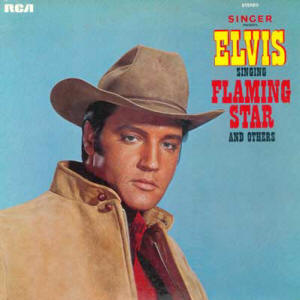
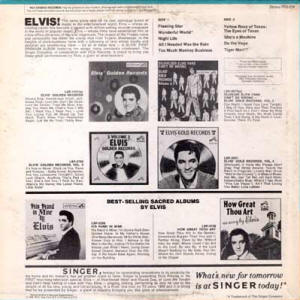
In October 1968 the stores of The Singer Company
started to sell an album called "Singer Presents
Elvis Singing Flaming Star And Others". The
record was a part of the sponsoring contract
between the sewing machine company and
NBC/Universal regarding the television special
"SINGER presents Elvis" that was to be aired in
December. After six months RCA Victor's own
budget label CAMDEN took over and sold the album
regularly under the name of "Elvis Sings Flaming
Star". To the average fan it looked like one of
the king's usual albums, albeit it just featured
ten songs and was sold at a lower price.
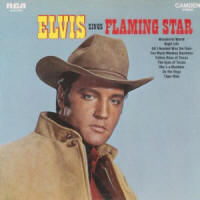
On April 19, 1969 the album entered the "Top
LPs Chart" and never made it past number 96,
even though it was retailed 500,000 times in its
initial sales period. To avoid, that labels
could "buy" good rankings by offering the
records at low prices, Billboard calculated
their charts by the turnover in USD. Therefore
"Elvis Sings Flaming Star" (as well as all the
following CAMDEN releases of the king) charted
comparably low in the US. However, the RIAA
calculated their awards by the number of sold
units and honored the record with Gold (1999)
and Platinum (2004). In Great Britain the charts
were also calculated by sold units and therefore
Elvis was able to score a number 1 hit with his
budget release. Worldwide "Elvis Sings Flaming
Star" sold 2 million copies, which translates to
300 million paid streams of the complete album
or 3 billion paid streams of individual tracks.
Everybody was quick to realize, that this
cheapie with nothing but archive material had
sold twice as good as "Speedway".
In 2016 the complete Presley catalogue was
restored and remastered by Vic Anesini for a
boxed set of 60 compact discs called "The Album
Collection". Sony Music Entertainment provides
the streaming platforms with the same versions
of the individual albums (some of them offering
bonus tracks), albeit in 24 bit/90 khz flac.
That means, if the platform of your choice
supports high resolution audio, you can enjoy
the tracks in the same quality Sony used to scan
and master them. On Spotify, which has a market
share of approximately 30% and is the only
platform that publishes streaming figures,
"Elvis Sings Flaming Star" accumulates
7 million
streams and is requested 2,000 times per day. So
today the album still is nearly twice as popular
as the previously released "Speedway"
soundtrack, but one certainly cannot call it a
hit.
The cover photo was made in 1967 in
connection to the western comedy "Stay Away,
Joe". The backside of the sleeve was used to
advertise the "Golden Records" series as well as
the king's gospel albums. The first edition of
"Elvis Sings Flaming Star" included a photo
card.
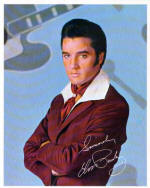
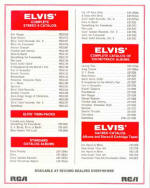
With the exception of
"Flaming Star" all tracks on this album were
previously unreleased. The majority of the songs
had been recorded for movies, but there also was
a regular studio recording and an outtake from
the tv special "SINGER presents Elvis". In total
the album has a running time of 20:30 minutes.
Flaming StarOn August
8, 1960 Elvis taped "Black Star", the title song
of his latest movie, at Radio Recorders in
Hollywood/California. After 13 takes he also
produced 5 insert-takes, the master was a splice
of the takes 13 and 5. Unfortunately 20th
Century Fox re-named the western to "Flaming
Star", so Sid Wayne and Sherman Edwards had to
adjust their song and Elvis had to record it
again. He did so on October 7th and needed 6
takes to archive a satisfactory result.
Originally RCA Victor hadn't planned to release
any music from that movie, but when several
radio stations played illegal copies of "Flaming
Star", the label hastily compiled an extended
player named "Elvis By Request" and included
this very song.
Wonderful WorldThis walz was
known from Elvis' current movie "Live A Little,
Love A Little". He had recorded it on March 7,
1968 at Western Recorders in
Hollywood/California. While the film featured
the seventh take, this album presented
performance number 17. "Wonderful World" was
written by Guy Fletcher and Doug Flett, the
first artist to record the tune was Cliff
Richard. The song is no highlight, but certainly
much better than many other carols Elvis
performed in his movies.
Night Life
Elvis had recorded "Night Life" on July 9, 1963
at Radio Recorders in Hollywood/California for
the MGM production "Viva Las Vegas" within 14
takes. Finally the tune wasn't used in the movie
and the king had also refused to have it
released on the compilation "Elvis For
Everyone!" in 1965. Three years later he had
changed his mind and approved the track. As the
title suggests the song by Bill Giant, Bernie
Baum and Florence Kaye deals with the narrator's
joys of the night life (neon lights, gamblers
and beautiful women). It's an above average
movie tune.
All I Needed Was The Rain
The Presley fans knew the track from the western
comedy "Stay Away, Joe", which had been shown in
the cinemas earlier this year. The bluesy song
was written by Sid Wayne and Ben Weisman and is
much better than most of the other stuff the
king sang in his movies. The recording was done
at RCA Studio B in Nashville/Tennessee on
October 1, 1967. The band recorded a music track
within three takes, to which Elvis later added
his voice. It's not known how many attempts he
needed.
Too Much Monkey Business
The Chuck Berry song was not connected to a
movie and was recorded for a regular release at
RCA Studio B in Nashville/Tennessee. The 14th
take was selected for release and enhanced with
the guitar playing of Jerry Reed. He needed five
takes for his part. The narrator describes
several stages of his life. Elvis updated the
lyrics and moved the military mission from
Yokohama to Vietnam. He's really on fire and
it's obvious, how much fun he has with this
song. To me it's a mystery, why Elvis agreed to
waste such a great track on a budget album.
Well, maybe he simply didn't like his
performance as much as I do.
The Yellow Rose Of Texas / The Eyes Of
Texas
Randy Starr and Fred Wise compiled the
traditionals for the movie "Viva Las Vegas".
Rusty (Elvis) sings it in a casino in front of a
bunch of hillbillies. The recording was made at
Radio Recorders in Hollywood/California on July
10, 1963. The king recorded 9 takes of the
medley. Because professional singers would have
sounded too good for a casino audience, the part
was done by the instrumentalists. Back in 1965
"The Yellow Rose Of Texas" / "The Eyes Of Texas"
had also been suggested to the king for the
"Elvis For Everyone!" album. Once again he
seemed to have changed his mind by 1968 and
approved the release.
She's A Machine
Elvis recorded "She's A Machine" on September
29, 1966 at the Paramount Scoring Stage in
Hollywood/California. Take 13 was intended to be
used in the movie "Easy Come, Easy Go" and take
15 was supposed to be used on the soundtrack
release. Because the king didn't like the song
by Joy Byers at all, Paramount and RCA Victor
agreed to file it away. Obviously Elvis had
lowered his standards, otherwise he wouldn't
have approved so many songs he had rejected
before.
Do The Vega
The same applies to "Do The Vega". It had been
recorded for "Viva Las Vegas" but finally wasn't
used in the movie. In 1965 RCA Victor suggested
a release on the compilation album "Elvis For
Everyone!", but the singer opposed and the track
stayed in the vaults. By 1968 he had no concerns
to have it released. Even though the Vega
wouldn't have been a smash, the song itself is
not bad at all and certainly above the level of
most of the movie tunes Elvis recorded between
1965 and 1967. That's quite surprising, because
it was written by Bill Giant, Bernie Baum and
Florence Kaye, who had penned so many of these
mediocre songs. By the way: "Do The Vega" was
taped on July 10, 1963 at Radio Recorders in
Hollywood/California.
Tiger Man
The management of The Singer Company insisted on
having a song from the sponsored show on the
album. Because Colonel Parker and RCA Victor had
no intention in sharing anything from the
soundtrack they wanted to sell, they opted for a
performance of "Tiger Man". It had been recorded
on June 27, 1968 during the informal live
session (the 8:00 pm edition), but was cut from
the show in favor of "Blue Christmas". The song
was written by Sam Burns and Joe Hill Louis, the
first one to release it was Rufus Thomas in
1953. Elvis' voice is rough, he's full of power
and rocks even harder than in his glory days.
Verdict
For a fair price the fans got a song,
that wasn't available for several years plus
nine unreleased tracks. The quality of the
material varies, but in total "Elvis Sings
Flaming Star" is much better than most of
the king's soundtrack albums of the
mid-sixties.

(C) CAMDEN / RCA Records
![]()




